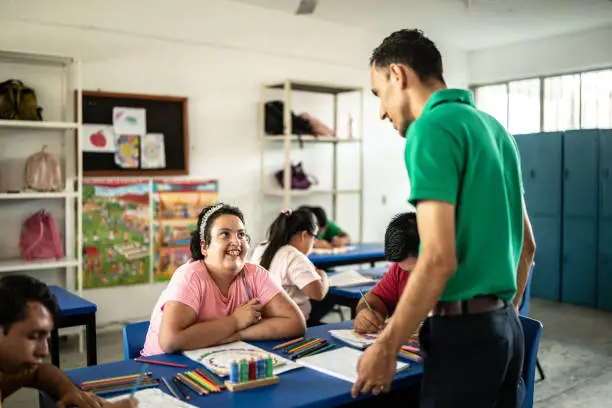Intellectual and Developmental Disability Grants.
Intellectual and Developmental Disabilities (IDDs) can pose significant challenges for affected individuals and their families, both emotionally and financially. The continuous need for specialized treatments, education, and care can often be overwhelming.
To alleviate some of these hardships, numerous organizations across the United States provide grants for IDDs. These funds are designed to support individuals, research efforts, service providers, and families affected by these disabilities.
Understanding Intellectual and Developmental Disabilities
IDDs comprise a broad range of conditions that are characterized by limitations in intellectual functioning (reasoning, learning, problem-solving) and adaptive behavior. Examples include Down Syndrome, Autism Spectrum Disorder, and Fragile X Syndrome, among others. Navigating life with an IDD often requires substantial assistance in various life activities, such as social skills, communication, self-care, or schoolwork.
The Role of Grants in Supporting IDDs
Grants play a crucial role in supporting individuals with IDDs and their families, providing funding for specialized education, care facilities, research, and development of novel treatments. These funds also play a significant part in advocating for policy changes to protect the rights of individuals with IDDs and ensure their inclusion in society.
Key Organizations Offering Intellectual and Developmental Disability Grants
Here is a list of some prominent organizations offering grants that specifically target intellectual and developmental disabilities:
1. The Administration for Community Living (ACL): A U.S. government agency that offers various funding opportunities for organizations supporting individuals with developmental disabilities. They fund initiatives like community living, elder rights, and health and wellness programs.
2. American Association on Intellectual and Developmental Disabilities (AAIDD): AAIDD provides grants for research and initiatives aimed at improving the lives of individuals with IDDs.
3. Autism Speaks: This organization focuses on autism research and advocacy, providing numerous grant opportunities for research, community grants, and special initiative grants.
4. The WITH Foundation: The WITH Foundation supports organizations that promote comprehensive healthcare for adults with developmental disabilities.
5. The Daniel Jordan Fiddle Foundation: This foundation focuses on adults with autism, offering grants for programs that foster independence, job satisfaction, and overall quality of life.
6. The National Down Syndrome Society (NDSS): The NDSS offers grants to organizations and individuals advocating for the rights and well-being of people with Down Syndrome.
7. The Global Down Syndrome Foundation: They fund research and medical care for people with Down Syndrome, providing various grant opportunities each year.
8. Els for Autism: This organization offers grants for services that help people with autism and their families.
9. Organization for Autism Research (OAR): OAR funds new and innovative research that directly impacts those living with autism.
10. The Doug Flutie Jr. Foundation for Autism: Provides grants for organizations that offer services and programs enhancing the quality of life for people with autism.
11. The HollyRod Foundation: Funds support and resources for families affected by an autism diagnosis.
12. National Fragile X Foundation: Offers grants for research into Fragile X syndrome and associated disorders.
13. The MIND Institute: Part of the University of California, Davis, the MIND Institute provides funds for research on neurodevelopmental disorders.
14. The Pacer Center: Provides grants for activities that benefit children with disabilities and their families.
15. The Disability Rights Fund: Supports persons with disabilities in developing countries, providing grants for advocacy and capacity-building efforts.
16. The Reeve Foundation: Offers grants for nonprofits that provide services to individuals living with paralysis.
17. The Joseph P. Kennedy Jr. Foundation: Provides grants to promote inclusion of people with intellectual and developmental disabilities in all aspects of society.
18. The Arc of the United States: Offers multiple funding opportunities for programs that serve people with intellectual and developmental disabilities and their families.
19. National Institute of Child Health and Human Development (NICHD): A part of NIH, NICHD funds research on developmental disabilities and conditions that affect child health.
20. The Special Hope Foundation: They offer grants to programs that provide healthcare to adults with developmental disabilities.
Practical Application of IDD Grants: A Case Study
Let’s look at a practical application of how these grants can change lives, by examining the story of The Sunshine Community. A recipient of a grant from The WITH Foundation, The Sunshine Community is a residential facility that offers housing, daily care, and social opportunities for adults with intellectual and developmental disabilities.
This grant provided necessary funding to integrate a comprehensive healthcare program into their services, focusing on preventive care, health education, and providing accessible healthcare.
The grant enabled them to employ a full-time nurse, introduce regular health check-ups and screenings, and host health education workshops.
As a result, residents experienced an increase in their overall health and wellness, demonstrating the immense impact these grants can have.
Navigating the Application Process for IDD Grants
The process for applying for IDD grants can vary based on the organization, but there are commonalities. Typically, organizations and individuals looking to apply should begin by conducting thorough research to find the grants most suitable for their specific needs. This involves understanding the grant’s objectives, eligibility criteria, and application process.
Most grant applications require detailed proposals outlining the project’s intent, the need for funding, expected outcomes, and how the funds will be utilized. It’s crucial to clearly communicate the impact of your project and how it aligns with the grant’s goals. Keep in mind that many foundations prioritize innovative ideas and projects that demonstrate sustainable impact.
The competition for these grants can be intense, so it’s critical to submit a compelling, well-prepared application. Additionally, considering the ongoing changes in the funding landscape due to COVID-19, it’s essential to stay updated on new funding opportunities and changes in application processes.
Conclusion
Intellectual and developmental disability grants serve as a lifeline for many individuals, families, and organizations. They enable research, support services, advocacy, and a myriad of programs aimed at improving the lives of those affected by these conditions.
For anyone involved with IDD, these grants are invaluable resources that promote inclusion, ensure support, and help pave the way towards a more understanding and accommodating society.
In the face of adversity, these grants act as a beacon of hope, proving that with the right resources, individuals with intellectual and developmental disabilities can live fulfilling, meaningful lives. To this end, understanding the different grants available and how to effectively apply for them is an essential part of supporting the IDD community.




